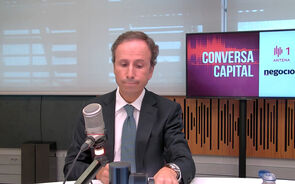Desigualdade, Alavancagem e Crises - IMF Working paper
2 mensagens
|Página 1 de 1
Because crisis are costly, redistribution policies that prevent excessive household indebtedness and reduce crisis-risk ex-ante can be more desirable from a macroeconomic stabilization point of view than ex-post policies such as bailouts or debt restructurings. T
Engraçado seria o FMI começar a exigir algo deste tipo quando dá ajuda a um país.
Desigualdade, Alavancagem e Crises - IMF Working paper
Vá lá que de vez em quando sai alguma coisa de jeito lá daqueles lados ...
Inequality , Leverage and Crises
how high leverage and crises can arise as a result of changes in the income distribution
(Algo aliás que eu tb já aqui venho dizendo há algum tempo )
http://www.imf.org/external/pubs/ft/wp/2010/wp10268.pdf
Inequality , Leverage and Crises
how high leverage and crises can arise as a result of changes in the income distribution
(Algo aliás que eu tb já aqui venho dizendo há algum tempo )
http://www.imf.org/external/pubs/ft/wp/2010/wp10268.pdf
ABSTRACT
The paper studies how high leverage and crises can arise as a result of changes in the income distribution. Empirically, the periods 1920-1929 and 1983-2008 both exhibited a large increase in the income share of the rich, a large increase in leverage for the remainder , and an eventual financial and real crisis. The paper presents a theoretical model where these features arise endogenously as a result of a shift in bargaining powers over incomes. A financial crisis can reduce leverage if it is very large and not accompanied by a real contraction. But restoration of the lower income group's bargaining power is more effective.
Introduction
The United States experienced two major economic crises over the past century - The Great Depression starting in 1929 and the Great Recession starting in 2007. Both were preceded by a sharp increase in income and wealth inequality, and a similarly sharp increase in debt-to-income ratios started to be perceived as unsustainable, it became a trigger for the crisis. In this paper (...) a crisis driven by income inequality can arise endogenously. The crisis is the ultimate result, after a period of decades, of a shock to the relative bargaining powers over income of two groups of households, investors who account for 5% of the population, and whose bargaining power increases, and workers who account for 95% of the population.
The model is kept as simple as possible in order to allow for a clear understanding of the mechanisms at work. The key mechanism is that investors use part of their increased income to purchase additional financial assets backed by loans to workers. By doing so, they allow workers to limit their drop in consumption following their loss of income, but the large and highly persistent rise of workers' debt-to-income ratios generates financial fragility which eventually can lead to financial crisis. Prior to the crisis, increased saving at the top and increased borrowing at the bottom results in consumption inequality increasing significantly less than income inequality. Saving and borrowing patterns of both groups create an increased need for financial services and intermediation. As a consequence the size of the financial sector, as measured by the ratio of banks' liabilities to GDP, increases. The crisis is characterized by a large-scale household debt defaults and an abrupt output contraction as in the 2007 U.S. financial crisis. Because crisis are costly, redistribution policies that prevent excessive household indebtedness and reduce crisis-risk ex-ante can be more desirable from a macroeconomic stabilization point of view than ex-post policies such as bailouts or debt restructurings. To our knowledge, our framework is the first to provide an internally consistent mechanism linking the empirically observed rise in income inequality between high income households and poor to middle income households, the increase in household debt-to-income ratios among the latter group , and the risk of a financial crisis.
(...)
Conclusions
(...)
In our model ir arises as a result of increases in the bargaining power of high income households. The key mechanism, reflected in a rapid growth in the size of the financial sector, is the recycling of part of the additional income gained by high income households back to the rest of the population by way of loans, thereby allowing the latter to sustain consumption levels, at least for a while. But without the prospect of a recovery in the incomes of poor and middle income households over a reasonable time horizon, the inevitable result is that loans keep growing , and therefore so does leverage and the probability of a major crisis that, in the real world, typically also has severe implications for the real economy
(...)
By contrast, restoration of poor and middle income households' bargaining power can be very effective, leading to the prospect of a sustained reduction in leverage that should reduce the probability of a further crisis.
The framework we have presented uses a closed economy setting. In future work we aim to extend this to an open economy. It is clear that the same mechanism presented in this paper, namely the increase in lending by high income households, would then extend not just to domestic poor and middle income households, but also to foreign households. The counterpart of this capital account surplus in the foreign country would of course be an increase in its current account deficit. In other words, this provides a potential mechanism to explain global current account imbalances triggered by increasing income inequality in surplus countries.
"In my whole life, I have known no wise people over a broad subject matter area who didn't read all the time - none, zero" - Charlie Munger
"Entre os seres humanos, existe uma espécie de interacção que assenta não nos conhecimentos, nem sequer na falta de conhecimentos, mas no facto de não se saber quanto não se sabe ..." - John Kenneth Galbraith
"Entre os seres humanos, existe uma espécie de interacção que assenta não nos conhecimentos, nem sequer na falta de conhecimentos, mas no facto de não se saber quanto não se sabe ..." - John Kenneth Galbraith
2 mensagens
|Página 1 de 1
Quem está ligado:
Utilizadores a ver este Fórum: Google [Bot] e 67 visitantes



